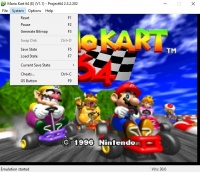Difference between revisions of "Video Game Console Emulation"
(Added image description) |
|||
| Line 1: | Line 1: | ||
| − | [[File:project64-3691-6.jpeg|200px|thumb|right| | + | [[File:project64-3691-6.jpeg|200px|thumb|right|An emulator playing Mario Kart 64]] |
Video game console emulation is the practice of emulating a video game console to allow video games that were originally designed to work on a target platform to work on another target platform. This process is achieved by creating software that emulates the technical behavior of the game's target platform (i.e. Nintendo 64) and importing game files to play on the emulator, effectively allowing video games to play on different platforms. While emulation can achieve the same experience as the original platform, it can also include several enhancements, such as graphical or sound features, save spaces, that aren't present on the original platform or game. Emulators can also be used as debuggers for the game and users can look see how the game is used in memory and even made modifications in the form of Rom Hacks. | Video game console emulation is the practice of emulating a video game console to allow video games that were originally designed to work on a target platform to work on another target platform. This process is achieved by creating software that emulates the technical behavior of the game's target platform (i.e. Nintendo 64) and importing game files to play on the emulator, effectively allowing video games to play on different platforms. While emulation can achieve the same experience as the original platform, it can also include several enhancements, such as graphical or sound features, save spaces, that aren't present on the original platform or game. Emulators can also be used as debuggers for the game and users can look see how the game is used in memory and even made modifications in the form of Rom Hacks. | ||
Since its inception in the mid-1990s, video game console emulation has been a topic of controversy among gamers with critics claiming emulators are simply a vehicle for piracy while also being praised for preservation efforts as well as encouraging the homebrew community of making games as well as providing educational opportunities for users wanting to know about game development. Though the field of emulation began as a niche field for hobbyist developers on personal computers, it drew particular interest in the late 1990s when emulation efforts eventually caught up to emulating modern game consoles. Although they were eventually taken to court in accusations of piracy, they were found to be legitimate competition and are now considered legal entities today. Nevertheless, they remain controversial for their relative inability to prevent piracy and potentially make it much easier. | Since its inception in the mid-1990s, video game console emulation has been a topic of controversy among gamers with critics claiming emulators are simply a vehicle for piracy while also being praised for preservation efforts as well as encouraging the homebrew community of making games as well as providing educational opportunities for users wanting to know about game development. Though the field of emulation began as a niche field for hobbyist developers on personal computers, it drew particular interest in the late 1990s when emulation efforts eventually caught up to emulating modern game consoles. Although they were eventually taken to court in accusations of piracy, they were found to be legitimate competition and are now considered legal entities today. Nevertheless, they remain controversial for their relative inability to prevent piracy and potentially make it much easier. | ||
Revision as of 19:57, 21 January 2022
Video game console emulation is the practice of emulating a video game console to allow video games that were originally designed to work on a target platform to work on another target platform. This process is achieved by creating software that emulates the technical behavior of the game's target platform (i.e. Nintendo 64) and importing game files to play on the emulator, effectively allowing video games to play on different platforms. While emulation can achieve the same experience as the original platform, it can also include several enhancements, such as graphical or sound features, save spaces, that aren't present on the original platform or game. Emulators can also be used as debuggers for the game and users can look see how the game is used in memory and even made modifications in the form of Rom Hacks.
Since its inception in the mid-1990s, video game console emulation has been a topic of controversy among gamers with critics claiming emulators are simply a vehicle for piracy while also being praised for preservation efforts as well as encouraging the homebrew community of making games as well as providing educational opportunities for users wanting to know about game development. Though the field of emulation began as a niche field for hobbyist developers on personal computers, it drew particular interest in the late 1990s when emulation efforts eventually caught up to emulating modern game consoles. Although they were eventually taken to court in accusations of piracy, they were found to be legitimate competition and are now considered legal entities today. Nevertheless, they remain controversial for their relative inability to prevent piracy and potentially make it much easier.
